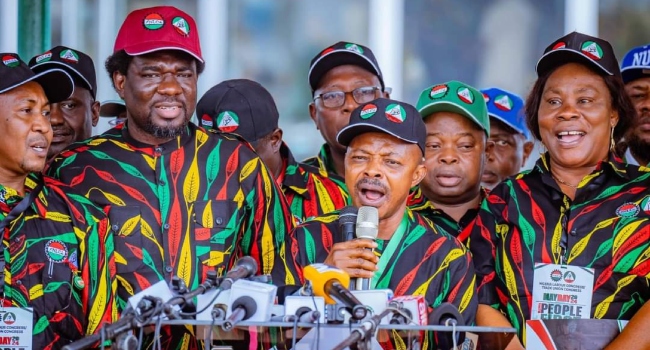Despite the rollout of the new national minimum wage across all 36 states and the Federal Capital Territory, workers across Nigeria are finding it increasingly difficult to afford daily essentials. Data reviewed over the weekend shows that states currently pay an average of N73,471.43, which is roughly five percent higher than the Federal Government’s benchmark of N70,000. However, this marginal increase has done little to offset the steep cost of living, leaving many workers barely able to feed themselves or their families.
A deeper look reveals that states like Akwa Ibom, Bayelsa, Delta, Enugu, Lagos, Niger, Oyo and Rivers have implemented more generous wage structures, offering salaries well above both the federal minimum and national average. But across the board, inflation has sharply reduced the real value of incomes. Labour leaders argue that gains made through prolonged negotiation have been wiped out in under a year. The consensus among unionists is that the government has effectively reversed the wage increase by failing to check inflation and rising costs.
Headline inflation currently stands at around 24 percent. In real terms, this means the average minimum wage is worth just about N55,000—down by nearly 25 percent from its intended value when the law came into effect. Even with nominal salary increments, most workers say their purchasing power has collapsed.
Sources revealed that despite the formal implementation of the new wage law, most states have yet to agree on consequential adjustments that should raise overall salaries in line with economic realities. With salaries ranging between N70,000 and N85,000, workers continue to grapple with the surging costs of food, fuel, electricity, rent, transportation, telecommunications, and school fees. According to the National Bureau of Statistics, the average cost of a healthy daily diet for one adult was N1,255 in August 2024. For a worker earning N70,000 per month, this means spending over 53 percent of their salary on meals alone.
The implementation timeline also varies from state to state. Enugu has not started formal negotiations but has begun provisional payments of N80,000. Meanwhile, Akwa Ibom and Bayelsa began paying N80,000 in November 2024 after negotiating with their respective state labor councils. Abia, Adamawa, Anambra, and Bauchi are all paying N70,000 as per agreements with their local unions.
Yet, the law does not apply universally. Part-time staff, commission-based workers, seasonal employees like farmhands, and those working in small establishments with fewer than 25 staff are excluded. Workers in aviation and maritime roles are also left out. Many see this as a gap that needs urgent reform.
Still, some labour figures see a glimmer of hope. One notable achievement of the 2024 minimum wage law is the reduction of the wage renegotiation cycle from five years to three. This means another round of negotiation is expected in 2027. Peters Adeyemi, General Secretary of NASU, praised the shorter negotiation timeline, saying it allows for more realistic discussions based on fast-changing economic trends. He argued that Nigeria’s volatile economy cannot sustain a five-year cycle, given that daily changes in fuel prices, inflation, and currency value drastically affect workers’ ability to survive.
Labour leaders like Joe Ajaero of the Nigeria Labour Congress argue that despite the headline figure of N70,000, the effective wage remains too low when set against the relentless rise in living costs. He blamed the government for breaching its promise not to raise petrol prices—a key condition during the wage negotiation that brought labour down from its initial demand of N250,000. With full deregulation of the oil sector, removal of subsidies, and rising electricity tariffs, many see the 2024 wage law as a temporary patch that has failed to provide sustainable relief.
Human rights groups are also weighing in. Emmanuel Onwubiko, National Coordinator of the Human Rights Writers Association, said the current wage is among the lowest globally, adding that no state governor deserves praise for paying a sum that barely covers daily living expenses. He argued that a wage below $50 a month cannot sustain a small family, especially after the naira’s massive depreciation. According to him, the cost of living has increased at least fivefold in the past year, and N70,000 today cannot buy what N30,000 could a year ago.
He also expressed skepticism about states venturing into businesses to generate revenue. While praising Akwa Ibom for its success in aviation, he warned that such outcomes are exceptions, not the rule. He urged states like Enugu and Kogi to instead focus on building infrastructure and creating an enabling environment for private investment rather than chasing risky ventures in aviation or mining.
Some financial experts agree that the 2024 wage law, while flawed, is at least a step toward progress. Investment banker Tolulope Alayande commended labour for shortening the negotiation cycle, saying it gives room for periodic review and ensures wages keep pace with inflation. He acknowledged the inadequacy of the N70,000 wage but stressed that it reflects current fiscal constraints and the aftershocks of policy missteps by previous administrations.
As 2027 draws closer, there is growing anticipation that the next negotiation round could finally bridge the gap between workers’ earnings and the soaring cost of living. For now, however, many Nigerians are simply trying to make ends meet on a wage that feels more symbolic than sustainable.

